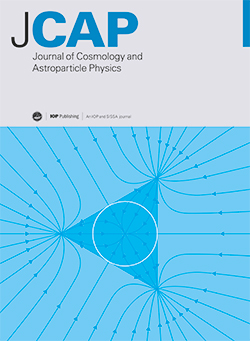HOD-informed prior for EFT-based full-shape analyses of LSS
IF 5.3
2区 物理与天体物理
Q1 ASTRONOMY & ASTROPHYSICS
Journal of Cosmology and Astroparticle Physics
Pub Date : 2025-04-15
DOI:10.1088/1475-7516/2025/04/041
引用次数: 0
Abstract
To improve the performance of full-shape analyses of large-scale structure, we consider using a halo occupation distribution (HOD)-informed prior for the effective field theory (EFT) nuisance parameters. We generate 320 000 mock galaxy catalogs using 10 000 sets of HOD parameters across 32 simulation boxes with different cosmologies. We measure and fit the redshift-space power spectra using a fast emulator of the EFT model, and the resulting best-fit EFT parameter distributions are used to create the prior. This prior effectively constrains the EFT nuisance parameter space, limiting it to the space of HOD-mocks that can be well fit by a EFT model. We have tested the stability of the prior under different configurations, including the effect of varying the HOD sample distribution and the inclusion of the hexadecapole moment. We find that our HOD-informed prior and the cosmological parameter constraints derived using it are robust. While cosmological fits using the standard EFT prior suffer from prior effects, sometimes failing to recover the true cosmology within Bayesian credible intervals, the HOD-informed prior mitigates these issues and significantly improves cosmological parameter recovery for ΛCDM and beyond. This work lays the foundation for better full-shape large-scale structure analyses in current and upcoming galaxy surveys, making it a valuable tool for addressing key questions in cosmology.基于eft的LSS全形状分析的hod通知先验
为了提高大尺度结构全形状分析的性能,我们考虑在有效场论(EFT)干扰参数中使用halo - occupation distribution (HOD)-informed prior。我们在32个具有不同宇宙学的模拟盒中使用1万组HOD参数生成了32万个模拟星系目录。我们使用EFT模型的快速仿真器测量和拟合红移空间功率谱,并使用得到的最佳拟合EFT参数分布来创建先验。这种先验有效地约束了EFT干扰参数空间,将其限制在可以被EFT模型很好地拟合的hod模拟空间中。我们测试了不同配置下先验的稳定性,包括改变HOD样本分布和包含十六进矩的影响。我们发现我们的hod通知先验和使用它导出的宇宙学参数约束是鲁棒的。虽然使用标准EFT先验的宇宙学拟合受到先验效应的影响,有时无法在贝叶斯可信区间内恢复真实的宇宙学,但HOD-informed先验减轻了这些问题,并显着改善了ΛCDM及以后的宇宙学参数恢复。这项工作为在当前和未来的星系调查中更好地进行全形状大尺度结构分析奠定了基础,使其成为解决宇宙学关键问题的宝贵工具。
本文章由计算机程序翻译,如有差异,请以英文原文为准。
求助全文
约1分钟内获得全文
求助全文
来源期刊

Journal of Cosmology and Astroparticle Physics
地学天文-天文与天体物理
CiteScore
10.20
自引率
23.40%
发文量
632
审稿时长
1 months
期刊介绍:
Journal of Cosmology and Astroparticle Physics (JCAP) encompasses theoretical, observational and experimental areas as well as computation and simulation. The journal covers the latest developments in the theory of all fundamental interactions and their cosmological implications (e.g. M-theory and cosmology, brane cosmology). JCAP''s coverage also includes topics such as formation, dynamics and clustering of galaxies, pre-galactic star formation, x-ray astronomy, radio astronomy, gravitational lensing, active galactic nuclei, intergalactic and interstellar matter.
 求助内容:
求助内容: 应助结果提醒方式:
应助结果提醒方式:


